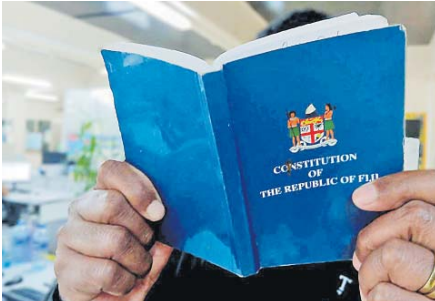BY RATU SAINIVALATI NAVOTI
Fiji is at the foot of a constitutional cliff and is once again navigating delicate constitutional waters.
The ongoing debate over the legitimacy and future of the 2013 Constitution continues to stir strong opinions across our political, legal, and civil society spaces. Importantly, these debates are now properly before the courts, which have been asked to consider fundamental questions concerning the status of the 2013 and 1997 Constitutions. I write not to comment on or pre-judge matters that are sub judice and now rightly entrusted to the court’s wisdom.
The issues before the court involve complex legal arguments, and it is appropriate for all of us to respect that process and await the court’s determination.
Rather, my purpose here is to reflect on an important legal doctrine which may offer useful perspective to the wider public as we continue to discuss the constitutional future of our nation, wholly without prejudice to the court’s eventual ruling.
The real issue is constitutional continuity
AT the heart of Fiji’s constitutional discussions lies a fundamental question of continuity: What is the true legal status of our constitutional instruments, particularly the 1997 and 2013 Constitutions?
Whatever view one holds about this issue, it is clear for over a decade the 2013 Constitution has served as Fiji’s governing document. At the same time, the circumstances under which it was promulgated have left some unresolved questions about its legal origins. The process now before the court offers an opportunity for those legal questions to be addressed by the best institution equipped to provide authoritative guidance — the judiciary.
The De Facto Officer Doctrine: A stabilising principle
As the nation awaits the outcome of these proceedings, it may be helpful to consider a long-established legal principle within the common law tradition: The De Facto Officer Doctrine.
This doctrine, well-known to similar legal systems such as Fiji’s, provides that acts carried out by public officials under the colour of lawful authority remain valid, even if it is later determined that their appointment or the legal foundation for their office was defective.
The primary rationale for this doctrine is public interest and institutional stability. It ensures that governments continue to function, that laws and decisions are not thrown into doubt retroactively, and that the public can rely on the actions of public authorities in good faith.
Should the court ultimately find irregularities in constitutional continuity or legal authority (again, entirely a matter for the court), the De Facto Officer Doctrine offers a mechanism by which Fiji’s public administration, judicial decisions, international agreements, and public service can be preserved without creating legal chaos.
A middle path: Law over politics
The important point for public reflection is this: There exists a legal path forward that need not rely on contentious political processes, nor risk institutional paralysis. By allowing the courts to determine constitutional questions, and by recognising legal doctrines such as the De Facto Officer Principle, Fiji can:
n Protect the integrity of government actions taken over the past decade;
n Preserve stability and confidence in public institutions;
n Allow for constitutional clarity without undermining the good faith acts of public servants and officeholders; and
n Create space for any future constitutional reforms to proceed through transparent, lawful, and democratically legitimate processes.
Let the judiciary guide us
Fiji has experienced the heavy toll of political interventions in constitutional matters in the past. Now, for perhaps the first time in this complex debate, the matter is before the proper institution, the judiciary, for a principled, legal resolution.
We would all do well to respect that process, to refrain from political interference, and to reflect on the legal tools, like the de facto officer doctrine, that exist to protect both the rule of law and the stability of our State.
In law, as in life, sometimes the most stable path forward is not to tear down the house, but to reinforce its legal foundation. In constitutional matters, as in nation-building itself, there is wisdom in restraint and confidence in the rule of law.
n RATU SAINIVALATI NAVOTI is the Chief of the Small Island Developing States Unit at the UN Department of Economic and Social Affairs (UNDESA), UNHQ, New York. These are his personal views, not attributable to his employer or The Fiji Times.



